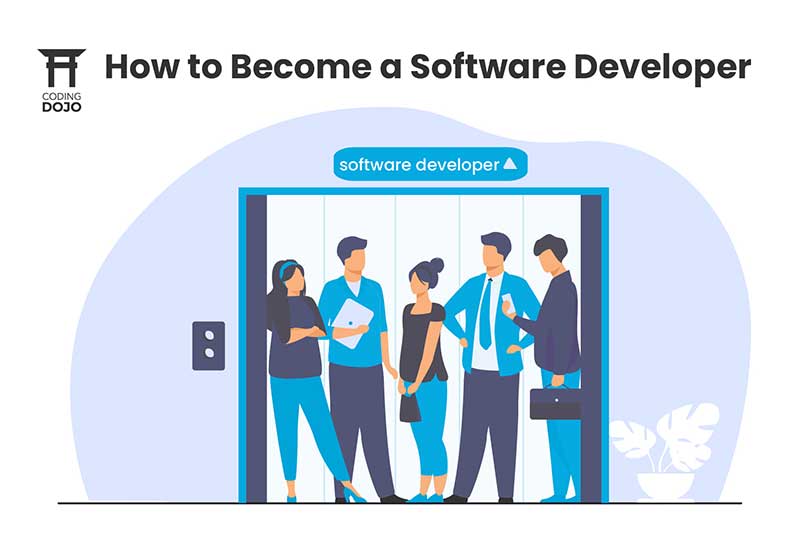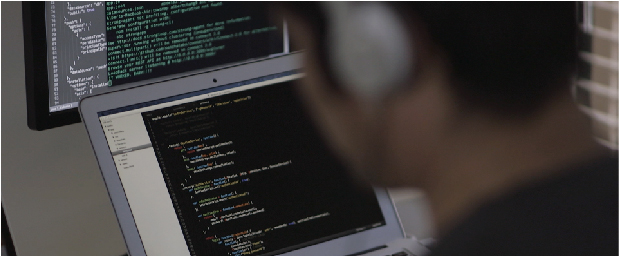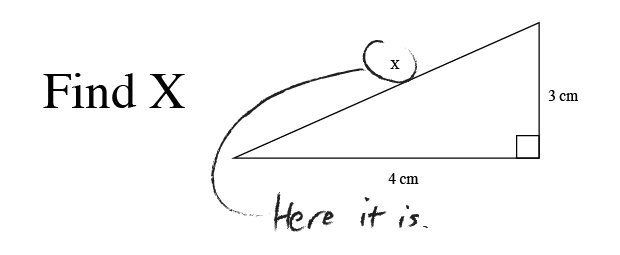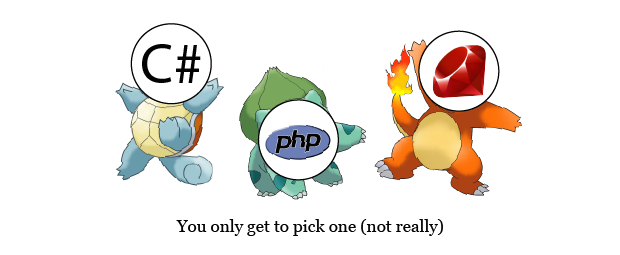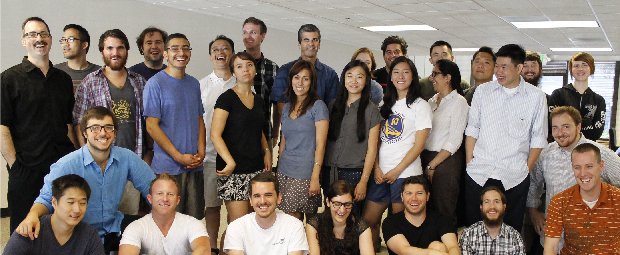Fundamentally, learning how to become a software developer is the same as pursuing any career path: hard work will truly determine success, not talent. Despite this undeniable truth, society continues to misconceive software development to be an industry exclusive to particularly niche personas: the geek, the math whiz, or the prodigy.
These are dangerous misconceptions that often deter everyday people, with ample potential for success, from learning how to become a software developer. Well, it’s time to put an end to these fallacies, and by the end, we hope you can make a more educated decision about a possible career in coding and the next step in learning how to become a software developer.
Read on to learn the 6 most common myths that misrepresent how to become a software engineer.
MYTH #1: I need to be a genius to become a developer
REALITY: Anyone can learn how to become a software developer
Software engineers, developers, devs, programming architects – whatever you wish to call them – are not geniuses. Like members of any industry, their skillfulness lies on a spectrum from excellent to poor. On the good side, you will find programmers with either remarkable talent or work ethic, maybe both; and on the bad side, well you can imagine.
But on any point of this spectrum, good or bad, you will find ordinary people, just like you. Because to get into this industry, everyone follows the same path: learning the technology and theory, and then implementing the learning through projects until mastery is achieved. That’s all there is to it.
Also Read: How To Become A Software Engineer
MYTH #2: Learning to code is like learning brain surgery!
REALITY: Learning to code is easy, mastering it is hard.
In addition to computer science theory, you of course need to learn how to code to become a software engineer. But don’t worry, it’s not brain surgery; it’s not even rocket science.
Learning to code is not as hard as most people think. Fundamentally, to code is to talk to a computer, but in a special language, such as PHP, Javascript, or Ruby. As a software engineer, your job is to talk to the computer and give it tasks to perform, such as building a website. To build the website, the computer requires the developer to meticulously write–out a list of step–by–step instructions – mini tasks to accomplish an overarching task.
As you can imagine, the initial tasks are easy to describe: “Computer, make my website interface 1000px wide!” But as these basic tasks increase in quantity, and begin to amplify in complexity, this step–by–step list of mini-tasks starts to become more convoluted and strenuous. (Imagine how many mini-tasks are required to build codingdojo.com!)
This is how software development works: it’s a highly sophisticated form of communication between a person and a computer, which is easy to learn at the start, but arduous to master at later stages.
But for someone new to programming, if they can communicate with others, they can learn to code. The first step is to learn the special languages that only the computer understands.
MYTH #3: I need a college degree to know how to become a software developer
REALITY: Programmers without degrees are more common than you think
Believe it or not, there’s a significant population of software developers in the tech industry who are self-taught, and to this day, still don’t have formal degrees. This is because computer programming is a trade, and it can be taught in the same manner that someone can learn how to use Adobe Photoshop or Illustrator.
Of course, when first starting out this person isn’t a full–fledged programmer or graphic designer, but they know how to use the tools, which is sufficient to get a job. Once they land a job, they build a portfolio and begin to master their trade. This is precisely how self–taught programmers to find success, even many graphic designers.
Additionally, many programming technologies such as PHP are extensively documented online and are enthusiastically supported by the online community, which further promotes opportunities for self–taught coding.
Furthermore, the rise of the coding bootcamp industry in the U.S. proves that a college degree is not required to learn how to become a software developer. Although a degree certainly carries more weight, this doesn’t devalue the coding bootcamp experience; both routes are effective stepping-stones to kickstart a career in software development.
Contrary to many misconceptions, the goal of a coding bootcamp is not to gain comparable coding skills to a 20–year veteran, which is an impossible feat. The goal is to graduate with ample coding experience to land a job in the tech–industry – an accomplishment attained by our Coding Dojo alumni and other coding bootcamp graduates many times over.
This career path is parallel to that of a computer science graduate from a four–year university. Although more reputable than attending a coding bootcamp, the CS degree is still fundamentally a tool to get a job in the tech–industry. But after landing the job, work experience and a portfolio will ultimately decide future career prospects, less so an alma mater or degree.
So do you absolutely need a degree to pursue a career in computer programming? The answer is an explicit “no”.
MYTH #4: I need serious math skills to learn how to become a software developer
REALITY: Success as a programmer and math proficiency are not directly correlated
To be a full–time programmer is not to be a gifted mathematician. You don’t need to know how to calculate the slope of an orthogonal trajectory to know how to code.
You don’t have to even know what this means. To learn how to become a software developer, you need to know basic algebra and practice strong problem–solving skills. Other than these two prerequisites, the degree of math you need to know is highly dependent on the project you are working on.
For example, if you’re designing user interfaces with a frontend framework like Twitter bootstrap, you’ll barely use any math – at a minimum, you need to be able to count pixels. In contrast, if the project specifically requires certain mathematical functionality, then yes, you will absolutely need to know some math.
Overall, you don’t need to know advanced math to become a programmer; but if you end–up having to use it, it’s due to either the nature of your employer or the project that landed on your desk, not the career as a whole.
MYTH #5: Knowing the ‘best’ programming language will accelerate my journey to learning how to become a software developer.
REALITY: There is no ‘best’ language to learn.
The requirements of a project will determine the ‘best’ programming language to use, and even then, you will need to use multiple languages to complete a project. This is because many languages work together, not against each other. Each language has an intended purpose within a given project.
For example, Javascript is historically a front–end language intended for UI development; meanwhile, PHP is a back–end language intended for back–end development. You may not know what this means precisely, but the bottom line is that comparing certain languages is like comparing a hammer to a screwdriver: they are designed for different tasks but together achieve a common goal.
In addition to working together, some programming languages are comparable and may essentially supply the same functionality: PHP is comparable to other back–end languages such as Java, Perl, or Ruby. However, this fundamental commonality doesn’t precisely equate to PHP being easily substitutable by Java, Perl, or Ruby.
Similarly, weighing comparable programming languages is like comparing Chinese to Spanish: they share insightful similarities but at the same time, critical differences. For brevity’s sake, here’s a great article on the topic that compares PHP versus Ruby.
In summary, learning the ‘best’ programming language is not your secret ingredient to becoming a software developer. As you contemplate a career in programming, disregard this trivial curiosity, and focus on getting your feet wet: start playing with code to learn the basics and fundamentals. Completing a mini–personal project is often the best source of motivation, and will ultimately decide which language to start with.
And as your ability to program advances and knowledge expands, you will gradually discover the intricacies of each language and further, understand why there is no ‘best’ programming language in the industry. For now, just start coding as soon as possible.
MYTH #6: It is too late for me to become a developer.
REALITY: It’s never too late to change careers!
The Coding Dojo student body debunks this myth a hundred times over. Students within our coding bootcamp come from all backgrounds and age groups. And by the end of our 12–week programming course, they can find jobs as full-stack web developers.
We’ve helped transformed an Alaskan fisherman into a web application developer at JP Morgan, taken seasoned software engineers, and taught them new technologies that they were unable to learn at work or on their own, and we’ve helped unemployed professionals accelerate their career transitions.
Regardless of prior experience, the path to becoming a software developer is open to anyone who aspires to take it. The only prerequisite is a relentless will to succeed. Our staff has witnessed our students complete this journey many times over, and so can you.
Learn How to Become a Software Engineer at Coding Dojo
Now that you’ve seen the truth behind the myths, hopefully, you can shrug off some of your doubts and find the confidence to potentially pursue a career in computer programming. As cliché as it may sound, if you put the time and effort in, there’s no reason you can’t succeed.
Now the only thing left is for you to get up and take the first step.
Coding Dojo can be that first step. Our three coding bootcamps give you the option to learn at your own pace. You can learn how to become a software engineer in 14 weeks, 16 to 32 weeks, or 28 weeks.
Once that’s complete, you’ll have access to our lifetime career services team. They’ll help you identify jobs that meet your desires, prep your resume, and get ready for your first software development interviews.

